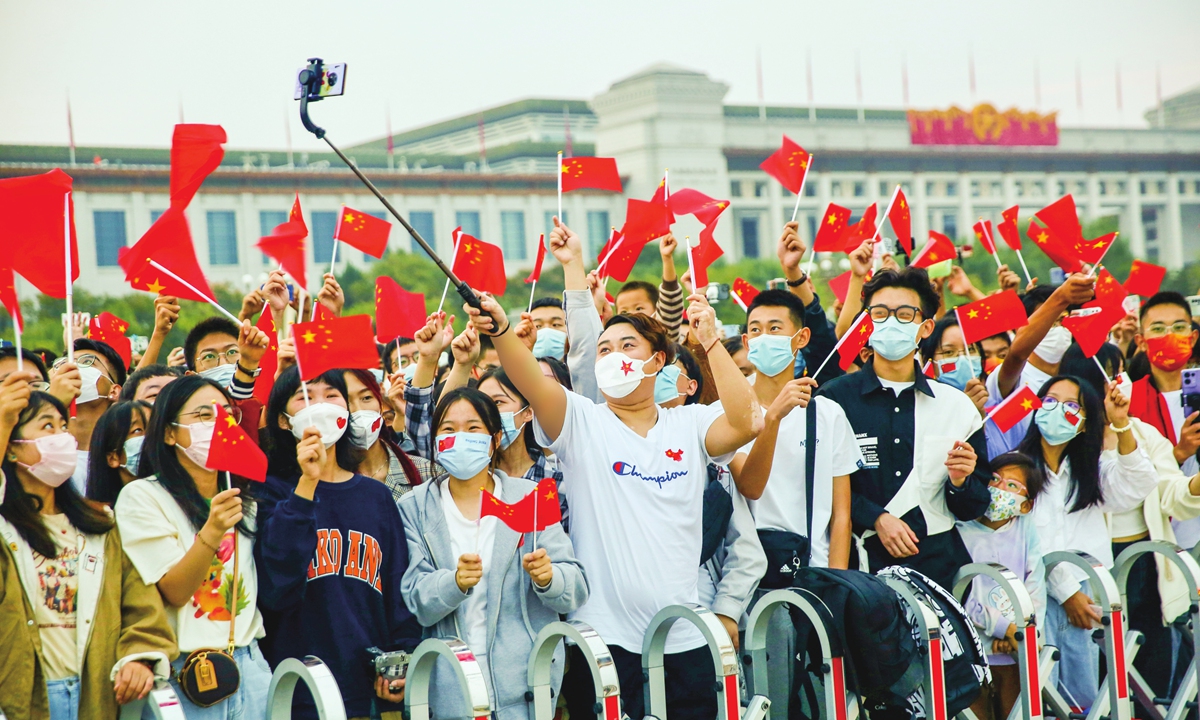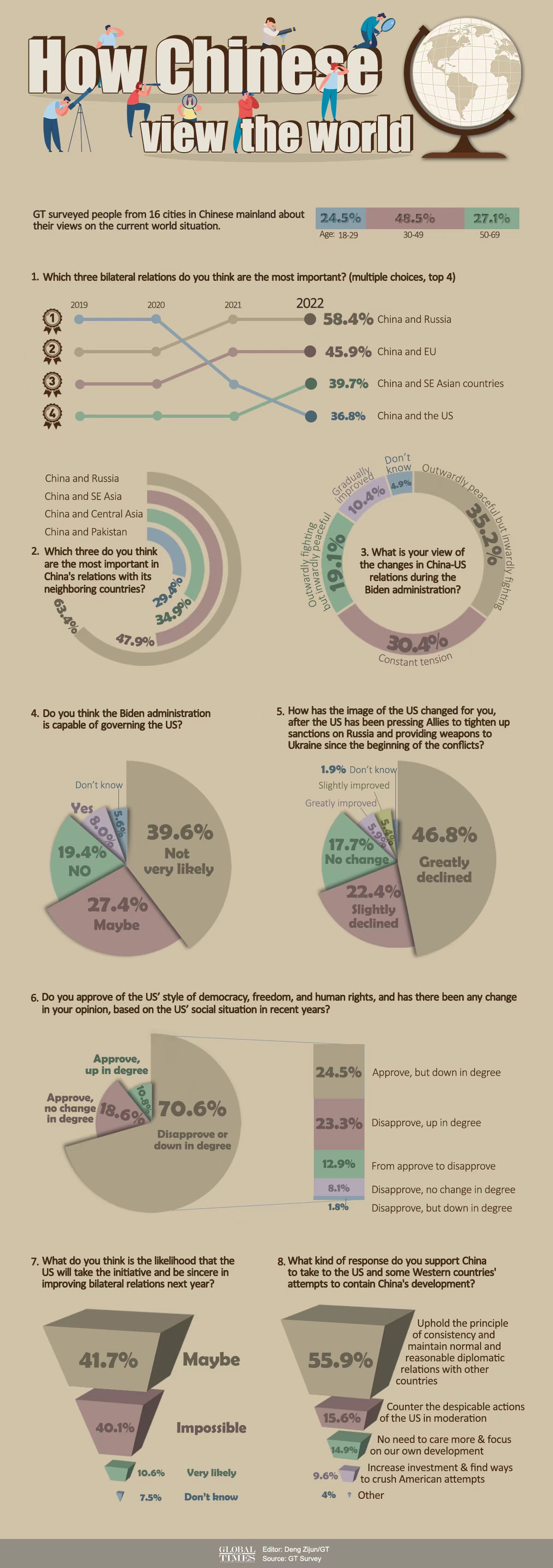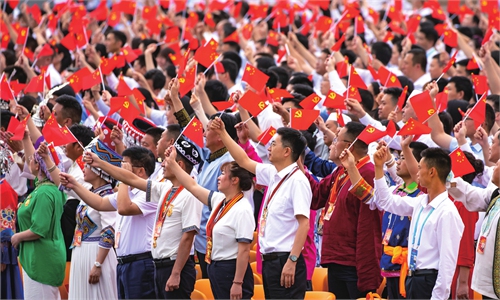GT survey: More than 60% of Chinese optimistic of future international environment despite US containment strategy

People take selfies with China's national flag while attending a flag-raising ceremony at Tiananmen Square on October 1, 2022.Photo:IC
More than 66 percent of Chinese participants of an annual survey conducted by the Global Times are optimistic of the international environment that China will face in the future despite the containment strategy launched by the US and some of its allies. Many Chinese also say China's ties with Russia are very important, and Russia's favorability has increased this year despite anti-Russia propaganda and sanctions launched by certain Western countries since the Russia-Ukraine conflict.
From December 8 to 15, the Global Times Research Center conducted the 17th "How Chinese view the world" public opinion survey that covered 16 major cities among all regions of the countries, including Beijing, Shanghai, Guangzhou, Shenzhen, Chengdu, Shenyang, Qingdao, Tianjin, Xi'an, Wuhan, Harbin, Kunming, Nanning, Lanzhou, Nanchang and Zhengzhou. The survey received effective 2,282 samples from ordinary people age 18-69.
The survey has found that the relations with Russia (58.4 percent), Europe (45.9 percent) and the Southeast Asia (39.7 percent) are becoming the top three important ties with other countries or regions, and the China-US relations have dropped 5 percentage points compare to the 2021 data, and now ranks at No.4 on the list (36.8 percent), and the China-Africa ties (19.1 percent) ranks No.5.
The survey also found that 66.4 percent of the participants are optimistic of the international environment that China will face in the future, with 25.3 percent saying the environment will get better. 41.1 percent said the environment will improve in general but that frictions with some other countries will remain frequent.
Chinese analysts said this survey shows that due to the reckless containment and competition, or confrontation in fact, strategy conducted by the US against China in recent years, more and more Chinese people have found the relationship with the US is unlikely to return to the past, and the major country diplomacy with Chinese characteristics that's upheld by the Chinese government, which eyes on boosting ties with other major powers like Russia and the EU, as well as emerging economies and developing countries in the ASEAN and Africa, is being supported by the Chinese public.

Graphic: Deng Zijun/GT
Views on the US
According to the survey data in the past years, the importance of the China-US relations in the mind of Chinese interviewees has continuously decreased in recent years, and China-Russia ties replaced China-US relations for the first time in 2021 to be ranked No.1 on the list.
The China-US relations are very complicated and consist of multiple factors, so the survey also asked participants about their views toward the administration led by US President Joe Biden, politicians from the Democrats and the Republicans, US media, US companies and entrepreneurs, US universities and scientific research institutes, as well as US sport leagues and films and television products.
The survey finds that most participants dislike the Biden administration (59.8 percent), Republicans (52.6 percent) and Democrats (51 percent), and 38.3 percent of them "dislike" US media, while 42.8 percent said they hold a "neutral" attitude, and only 13.2 percent "like" US media.
The China-US relations in general is indeed worsening as many Chinese people say the US is trying to crackdown on China on all aspects, with no sign of easing tension but only the sign of escalating tension in recent years, said experts.
Noticeably, US Speaker of the House of Representatives Nancy Pelosi's provocative visit to the Taiwan island this year was listed by participants as the third event that left deep impression on them, after Beijing Winter Olympic Games and Xi-Putin meetings.
Pelosi's provocative visit - a case of great concern for the entire Chinese nation - dealt a huge blow to China-US relations, resulting in a very negative impression about the US among the Chinese people, Xin Qiang, deputy director of the Center for American Studies at Fudan University, told the Global Times.
There are many reasons that have convinced ordinary people that China-US relations will unlikely recover, said analysts. Many families are afraid of sending their children to US universities, or work at the US companies or even travel to the US, because of the anti-China strategy held by the US government and the Sinophobia and racist opinions among the US public that generally caused by the attitude held by US politicians and US media in recent years, especially since the beginning of the COVID-19 pandemic, experts said.
"Many factors such as racial discrimination, especially hatred toward Asian Americans, unfounded and groundless investigations and harassment against Chinese people including business persons like Huawei CFO Meng Wanzhou or Chinese ethnic scientists, also add up the already growing doubts in China about visiting the US," Xin noted.
However, the survey finds more than 50 percent of Chinese participants said US sport leagues like the NBA and US movies and TV series are favorable despite they dislike the US government and politicians.
Xin said most Chinese people maintain a relatively high preference for US soft power elements as "rational" and "objective" views from ordinary people, as they know it was the fault of US politicians and some media that poisoned the current China-US relations, and it's unwise and irrational to oppose everything from the US.
Analysts said the survey data also indicated that the people-to-people exchanges between China and the US is necessary and important, and this is why both sides should make efforts to manage differences and competition, and try best to find a new way of peaceful coexistence to serve the fundamental interests of the two peoples.
On the view of US type of "democracy, freedom and human rights," 70.6 percent of participants said they disapprove or answered "less approve,'' which is a 5 percentage point increase compared with 2021. Among these participants, 23.3 percent answered "increasingly disapprove" and 24.5 percent chose "less approve" while 12.9 percent said they have "shifted from approve to disapprove."
Experts said the performance of the US governments from Donald Trump to Joe Biden in the past few years have seriously damaged US international image, and more and more people around the globe, including Chinese people, have found that the incompetence and failure of US political system cannot be changed by the power transition between the two parties.
The long-existing problems like inflation, the increasing gap between the rich and poor, racism and endless struggles between the two parties that tear the society apart, have not seen any sign of improvement and effective reform, and this will keep weakening US' image in the world.
The survey finds 59 percent of the Chinese participants believe the Biden administration is "unable to govern America" and 53.5 percent of them said the US with the leadership of the Biden administration is "unable to behave as a responsible major power." 40.1 percent of them believe it's "impossible" for the US to actively take actions and show sincerity to fix ties with China.
Views on other countries
While most Chinese people are losing faith on the ties with the US, their views on ties with Russia are getting increasingly favorable. About 70 percent of participants of the survey said "US' image is worsening" due to the anti-Russia sanctions and propaganda launched by the US and other Western countries since the Ukraine crisis.
Wang Yiwei, director of the Institute of International Affairs at the Renmin University of China, told the Global Times on Sunday that Chinese people have gradually realized that the Ukraine crisis was more like a trap set by the US and NATO to weaken Russia and the conflict was actually between Russia and the whole West.
Analysts said China has always been a neutral third party in the Ukraine crisis, so many Chinese people don't want to take sides on the complicated issue which can't simply blame Russia or Ukraine, and they don't want to change their views only because of Western propaganda, and many of them even think Russia has been treated unfairly by the West, and many Chinese are concerned that the US hegemony can launch reckless sanctions on anyone that refuses to obey, and what Washington is doing to Moscow could happen to China one day, while many people and governments around the globe, especially from non-Western world, also share similar concerns.
"From the beginning of the crisis, the US and the West described the Taiwan island as the next Ukraine, which made many Chinese people feel that what the West did to Russia today is what China will face tomorrow," Wang pointed out, saying that in this sense, many feel China and Russia share many common interests and their cooperation in tourism, trade and investment, and people-to-people exchanges can bring many opportunities of economic development, and this proves that the China-Russia ties guided by the consensus reached by the top leaders of the two countries are developing successfully and delivering benefits to the two peoples.

